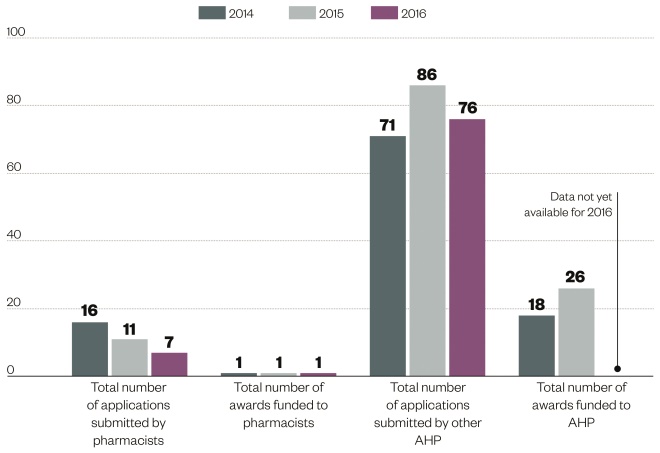
Shutterstock.com
It has been more than three years since The Pharmaceutical Journal reported that Health Education England (HEE) and National Institute for Health Research (NIHR) funding has to become available to enable pharmacists to pursue a personal clinical-academic training programme. Following this announcement, advice has been provided pharmacists on how to secure such funding and considerations to be taken when applying. Yet despite this, pharmacist and pharmacy technician uptake remains modest and trending towards fewer submitted applications (see figure 1).

Figure 1: Comparison between pharmacists and other allied health professional NIRH awards
Figure 1: Comparison between pharmacists and other allied health professional NIRH awards
There is a risk that pharmacy will fall behind in the Government’s vison to develop a group of non-medical clinical academics.
Why should I consider an ‘integrated clinical academic’ role?
An ‘integrated clinical academic’ is a term used to describe a health care professional who undertakes health care research alongside clinical activity. Because of their clinical interest, their research aims are often grounded in the day-to-day issues of their patients and service. Individuals who hold this dual role are in prime position to identify important research questions that matter to patients and health and social care, as well as their profession.
What awards are available?
There are five levels of award available, all of which require support of a clinical organisation as well as an academic institution (see Table 1).
| Name of HEE/NIHR scheme | Description |
|---|---|
| Internships | Designed to offer an introduction for graduates to all aspects of clinical research from trial design and data management through to undertaking primary research in a clinical environment. |
| Masters in Clinical Research Studentships | Designed for professionals who aspire to a career that combines continued clinical practice with independent research, and provides a comprehensive grounding in, and experience of, clinical research. Fully funded studentships are available annually at 10 HEI across England. |
| Clinical Doctoral Research Fellowships | Designed for graduates with some research experience who aspire to a career that combines research with continued clinical practice. |
| Clinical Lectureships | This lectureship scheme is designed for early post-doctoral professionals wishing to develop into independent clinical academic researchers. Award holders are supported to divide their time equally between their clinical and academic activities. |
| Senior Clinical Lectureships | Designed to facilitate the development of post-doctoral practicing clinicians with independent clinical research experience into clinical academic research leaders. Award holders are supported to divide their time equally between their clinical and academic activities. |
Source: ICA HEE/NIHR Integrated Clinical Academic Programme for non-medical healthcare professions found at: http://www.nihr.ac.uk/funding-and-support/funding-for-training-and-career-development/training-programmes/nihr-hee-ica-programme/ | |
The research component must lie within the remit of the NIHR and fulfil at least one of the Health Education England (HEE) priorities.
What is the NIHR remit and HEE priorities?
The NIHR has outlined what clinical training and health and social care research it is prepared to fund. A fundamental principle is that the research must have clear potential for benefitting patients and the public within five years of completion. For a successful application, it is vital that this is clearly articulated. There is also the potential for the NIHR to support high quality research into education for healthcare providers.
The following are identified as HEE Priorities:
- Improving out-of-hospital care;
- Creating the safest, highest quality health and care services (includes the development and evaluation of medical treatments, interventions or processes);
- Improving efficiency and productivity of the health and care system;
- Preventing ill health and supporting people to live healthier lives;
- Enabling people and communities to make decisions about their own health and care;
- Improving services through the use of digital technology, information and transparency;
- Delivering the right workforce with the right skills, values and competencies;
- Driving improvements in education and training that will have a real impact on the quality of care delivered to patients and service users.
What makes a successful application?
Preparation
Understanding the NIHR/HEE agenda and tailoring your research proposal accordingly will ensure your application is not swiftly rejected. The application form itself as well as the process is lengthy so it is best to start preparations early. Furthermore, you should identify suitable supervisors or collaborators early so they are aware and can contribute fully to your application. It is also helpful if you inform your clinical service manager as soon as possible so that they can support you and the application.
Seek help from the research design service
It is advised that all potential applicants contact their local NIHR Research Design Service (RDS) as soon as possible. The RDS is funded by the NIHR and is a free service available to all NHS researchers to help develop and submit high quality applied health and social care research applications. Specifically, the RDS advisers offer help throughout the application including giving guidance about whether the proposed research project is feasible and within the NIHR/HEE remit, methodological aspects of the application and incorporating patient and public involvement. More information can be accessed through their website: http://www.rds.nihr.ac.uk.
Know the assessment criteria
Essentially the application is assessed on the person, project and host institution:
- The person: The NIHR supports outstanding research in world-class facilities, but also individuals who can show they have the potential to be world-leaders in their discipline. As such, it is important you demonstrate outstanding clinical and research abilities and how this award will further your personal development. It is helpful to include supporting evidence such as presentations delivered, prizes awarded and membership of professional bodies/committees. Including publications you have written or been involved in will boost the credibility of the application. If you are considering submitting an article for publication, guidance on how to write a research article for peer review publication is a good place to start.
- Research proposal: The research project needs to be well thought through and robust but feasible within the time allocated. The quality of the proposed research strongly reflects the quality of the candidate as well as the level of research experience. Suitable research methods, whether quantitative or qualitative, must ensure the research questions can be answered satisfactorily.
- Institution: Consideration should be given to both your clinical setting and to the academic host — both of which should be supportive of the application. The research should be located within the best higher education institution for your study. This choice will need to be justified. Alongside a fitting university, the supervisors or mentors for the project should be renowned experts in the field to further illustrate how you and the project will be fully supported and so successful.
When can I apply?
The next round of awards are anticipated to be launched in March 2018. Further details can be found on the NIHR website available at: http://www.nihr.ac.uk/funding-and-support/funding-for-training-and-career-development/training-programmes/nihr-hee-ica-programme/

